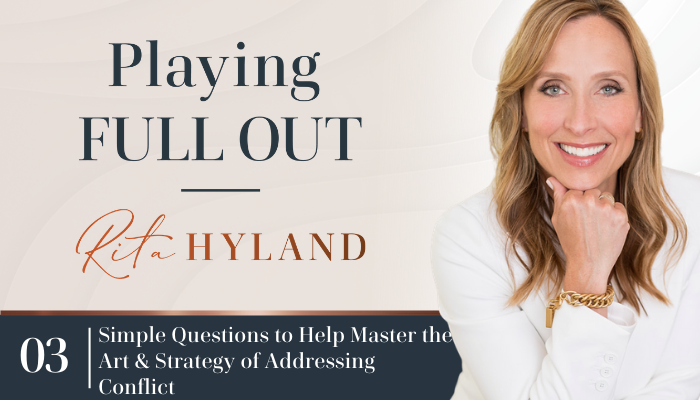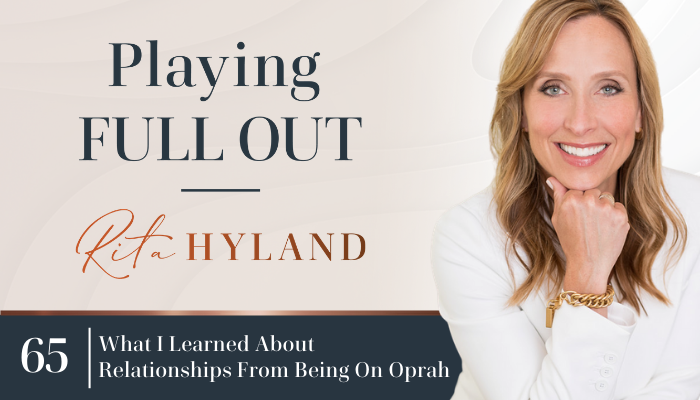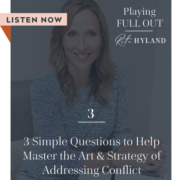
Do you avoid engaging in difficult conversation because you don’t know how to communicate clearly so that your message is heard and can move to a successful outcome? In this episode of Playing Full Out, I’m sharing a surprisingly simple 3-step strategy that’s going to improve your relationships, communication, and organizational impact, tenfold.
You can listen to the full podcast episode here, or continue reading below.
There’s something I’ve recognized in society today that I see as a prolific problem. It’s our inability to engage in healthy conflict or debate. Why won’t we move towards conflict? There are a lot of reasons, but at the base level our egos are in a desperate race to be right. Often we’ll take right over happy. We’re also afraid we’ll get hurt if we move toward a difficult conversation. We’re afraid of hurting others too.
Sometimes we don’t want to put forth the energy and the time to address situations that would benefit from being brought into the light. Instead we think that if we let it lie, it will die. The reality with conflict is that it’s residual. The resentment builds like a cancer. Slowly it feeds upon itself and escalates until anger and bitterness reside. The result: the conflict is amplified.
If we learn how to address conflict before it grows, if we have both the art, which is understanding what is underneath any type of unsupportive behavior or action and we combine that with the strategy, how to deliver the communication, we can move situations to desired outcomes more quickly and with less pain.
I’m going to share a three-step process with you that I believe can transform our communications, our relationships, and our organizations when used. I adapted some of this strategy from one or two books that I highly recommend. The first is Leadership and Self-Deception and the second is The Anatomy of Peace both written by the Arbinger Society.
Here are three simple questions to ask yourself when faced with conflict with another that will help you work through it successfully:
#1) “What is this person worried, concerned, or afraid of?”
At the base level of addressing and moving through conflict we have to understand that each individual desires to be seen and heard. When we’re only interested in our own perspective and proving ourselves right, we’re unable to look through the lens of another and thereby validate that we see them. There is no hope of conflict ever resolving if we cannot seek to understand as a first step. To do this we must be curious about what another (or others) might be worried, concerned or afraid.
When I say that we must understand the other individual, it doesn’t mean we must agree. It simply means we seek to understand they’re perspective.
To show you understand, two words to use are, “I sense.” “I sense you may be thinking or feeling….” This doesn’t mean that you know it for certain, but you’ve given some thought to it. You’re interested in seeing if you’re correct. In other words, “let’s discuss it.”
Don Miguel in his book, The Mastery of Love, states that when there is conflict in a relationship that one person has to catch the ‘anger ball.’ When two people are arguing it’s easy to throw the anger ball back and forth. One blaming or vindictive statement is lobbed. It’s caught. Then the receiver throws back another. Someone has to catch the anger ball in order to transform the conflict. Seeking to understand by asking yourself this first question and then engaging in dialogue is where you begin.
#2) “How am I unwittingly contributing to that worry, concern, or fear?”
The second step is to seek to understand your role in the situation whether you’re intentionally contributing to it or not. Ask yourself how you are unwittingly contributing to the person’s fear that you identified in question #1.
The more specific we are about how we’re contributing to another’s anxiety or stress, the sooner we can take action to alleviate with the help of the third question.
#3) “How can I help alleviate his fears?”
Why should we be concerned and seek to alleviate others’ worries, concerns, or fear? Here’s the reality. When the brain is operating from a negative, neutral, or stressed state, brain science has shown that our intelligence, problem solving, creativity, and communication, all decrease significantly. (For more on this check out Shawn Anchor’s Ted Talk on happiness in the workplace.)
When working in combination or collaboration with individuals, whether in our home space or in our workplace, our ability to move through (not around) conflict impacts our effectiveness and influence. We must be able to positively influence others in order for them to support our goals. For this reason the psychology of those we manage, support and lead becomes essential for our own progress and happiness.
Once you 1) identify what you sense another is worried, concerned, or afraid of and 2) you identify your role in it, take the next step and ask yourself how can you help alleviate their fears. Then begin to dialogue. The conversation looks like this… “I sense you don’t feel I take your opinion into account when I’m making decisions on our schedule. I see how I could have contributed to this, specifically when I made the vacation plan without consulting you. The truth is I do care. I want to hear your opinion because you often have ideas I haven’t considered.”
Notice the strategy to alleviate a person’s fear is to tell him the “truth” which is usually the opposite of their worry, concern or fear. “The truth is…(fill in the blank).”
An example of this strategy in play in the workplace looks like this, “I sense you think that I and the rest of the engineering department don’t care when this product rolls out to the consumer. I apologize to the extent I have contributed to that by delaying and adding more tests. The truth is I want to support the Marketing Department to meet its’ deadlines and get this out to the consumer as soon as we can. Here are some ideas I have. I’d like to hear yours.”
From the bedroom to the boardroom, this three-step process transforms conflict and disagreement to peace and understanding. 99 times out of 100 after you’ve caught the anger ball, and move the conversation from an anger and fear-based perspective to a truth or love-based perspective, the other person will meet you there. I’ve witnessed individuals use this approach to turn around marriages on the brink of divorce, bring together a brother and sister who hadn’t spoken for years, and transform organizations’ cultures and bottom lines.
There’s a man named Randy Pausch, who many of you probably already know. He was a professor at Carnegie Mellon and he developed a last lecture because he was dying of cancer. It was a really moving lecture that ended up being seen the world wide over and it later became a book.
One of the things that I most recall from what he said was to always address the elephant in the room. This is paradigm shifting for most of our world. Yet any time we shine the light on what is dark, it too becomes light.
Addressing conflict within our families or at our workplaces can be scary.
We often aren’t practiced at using our voices or naming the elephant in the room. We fear other people’s responses. We must become okay being uncomfortable. Brené Brown talks about being willing to be uncomfortable for three minutes so that you’re not uncomfortable for three hours, three days, three weeks, or three years.
Here are a few final tips to engage instead of shrink from conflict.
- Begin with a positive intention. Identify what the ideal outcome looks like.
- Make it safe to dialogue with you.
- Agree on a mutual purpose.
- Agree on a clear action plan.
Ronald Reagan said that, “…peace is not the absence of conflict, it is the ability to handle conflict by peaceful means.” Go there. You’ve got the framework. Write the three questions down on a 3×5 index card and see how many opportunities you have to use them this week both at home and work.
Resources:
Subscribe on iTunes for more tips, tools and inspiration to leading the optimal vision of your life, love and leadership. Remember, a half version of you is not enough. The world needs the fullest version of you at play.

___
About Rita Hyland
With over 20 years of experience as an executive and leadership coach, Rita helps leaders — emerging and established — excel in corporate and entrepreneurial environments.
Through her coaching programs, private coaching and masterminds, Rita shows leaders how to win consistently and create the impact and legacy they desire.
Central to Rita’s work is the understanding that you will never outperform your current programming, no matter how strong your willpower.
When you learn to use Rita’s proprietary Neuroleadership Growth Code, a technology which uses the best of neuroscience and transformational psychology to hit the brain’s buttons for change, YOU become both the solution and the strategy.
Rita believes if leaders were more clear about how transformation really works and more intentional about creating what they want, their impact, success and influence in the world would be unstoppable.
Her mission is to end talented, hard-working and self-aware leaders spending another day stuck in self-doubt or confusion and not contributing their brilliant work and talent the world so desperately needs.




